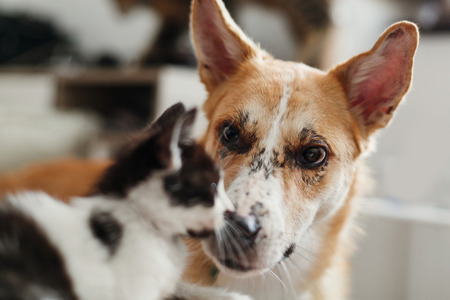Understanding Pet Ownership Laws in India
In India, pet ownership is not just about companionship; it also comes with a set of legal responsibilities and rights. As a pet parent, it is crucial to be aware of the laws and guidelines that govern pet keeping in your locality. The Constitution of India, under Article 51A(g), encourages citizens to show compassion towards animals. However, each state and city may have its own municipal by-laws that specifically address issues related to pets, such as registration, vaccination, and control over nuisance behavior. For example, many municipal corporations require dog owners to obtain a license for their pets and ensure timely vaccination against rabies. These rules are meant to promote harmony between pet owners and their neighbors while ensuring public health and safety. Additionally, the Animal Birth Control (Dogs) Rules, 2001, lay down specific provisions regarding stray dog management but also impact how community pets or owned dogs should be treated. As a responsible pet owner in India, knowing both your rights—such as the right to keep pets in apartments or housing societies—and your duties—like preventing your pet from causing disturbance or harm to others—is essential. Understanding these legal frameworks will help you address any conflicts with neighbors more effectively and safeguard your position if a dispute arises.
Common Neighbour Complaints about Pets
In Indian urban environments and apartment societies, pet ownership can sometimes lead to friction between neighbours. Understanding the typical complaints helps pet owners address issues proactively and maintain harmony in their community. Below are some of the most common concerns faced by residents when a neighbour keeps pets:
| Issue | Description | Indian Context Example |
|---|---|---|
| Noise Disturbance | Loud barking or constant noise from pets, especially during late hours, can disrupt peace. | Dogs barking at night in a Mumbai apartment complex causing sleep disturbance for neighbours. |
| Hygiene Problems | Poor management of pet waste leading to foul smells or unclean common areas. | Pet owners not cleaning up after their dogs during morning walks in Delhi gated societies. |
| Safety Concerns | Aggressive pets, particularly large dog breeds, may frighten or pose risks to children and elders. | A neighbour’s Rottweiler roaming without a leash in Bangalore residential colony parks. |
| Allergies & Health Issues | Some residents may have allergies triggered by fur or dander from pets. | Cats shedding hair in common corridors affecting asthmatic neighbours in Kolkata apartments. |
| Damage to Property | Pets scratching doors, damaging gardens, or soiling lifts and stairs can be a major concern. | A pet parrot damaging plants on shared balconies in Hyderabad flats. |
It is important to note that cultural attitudes towards animals can vary across different regions of India. While many consider pets part of the family, others may view them as potential sources of nuisance. Apartment Resident Welfare Associations (RWAs) often receive complaints regarding these issues, leading to internal policies or house rules for pet owners. Being aware of these common grievances is the first step towards responsible pet ownership and preventing unnecessary legal conflicts with neighbours.
![]()
3. Steps for Amicable Resolution
When facing concerns from your neighbour about your pet in India, it is always best to address the issue amicably before considering any legal action. Indian society highly values peaceful coexistence and community harmony. Here are some culturally sensitive steps you can take:
Polite Dialogue
Begin by initiating a calm and respectful conversation with your neighbour. Express genuine concern for their discomfort and assure them that you are willing to find a solution. Listen carefully to their grievances without interrupting, and try to understand the specific issues—be it noise, cleanliness, or safety.
Open Communication Channels
Invite your neighbour for tea or a casual meeting at a mutually convenient time. This gesture reflects traditional Indian hospitality and helps create a friendly atmosphere where both parties feel comfortable sharing their viewpoints.
Mediation with Community Elders
If direct communication does not resolve the matter, seek mediation through respected members of your housing society or local Resident Welfare Association (RWA). Elders and community leaders often have experience handling such disputes and can provide balanced guidance rooted in Indian values of compromise and mutual respect.
Involving Society Committees
Most urban societies in India have designated committees to handle resident grievances. Submitting a joint application or complaint can help document the issue formally while still aiming for a resolution without escalating to legal proceedings.
Adopting Preventive Measures
Demonstrate your commitment to being a responsible pet owner by implementing measures such as keeping your pet leashed in common areas, cleaning up after them, and minimizing noise during quiet hours. Share these efforts with your neighbour as reassurance of your proactive approach.
By prioritising dialogue, mediation, and community involvement—values deeply ingrained in Indian culture—you are more likely to resolve conflicts peacefully while maintaining good neighbourly relations.
4. Legal Rights and Responsibilities of Pet Owners
Owning a pet in India comes with specific legal rights and responsibilities designed to protect both animals and the community. Understanding these obligations is essential for harmonious co-existence, especially if disputes arise with neighbours.
Animal Welfare Board of India Guidelines
The Animal Welfare Board of India (AWBI) has issued comprehensive guidelines for pet owners. These guidelines emphasise humane treatment, responsible ownership, and respect for community standards. Key points include:
- No restriction on keeping pets: Residents’ associations or housing societies cannot ban pets but can issue reasonable guidelines for their management.
- No abandonment: Abandoning pets is a punishable offence under the Prevention of Cruelty to Animals Act, 1960.
- Right to complain: Neighbours have the right to approach authorities in case of nuisance or threat, but action must be taken lawfully.
Animal Birth Control (ABC) Rules
The Animal Birth Control Rules, notified under the Prevention of Cruelty to Animals Act, play a crucial role in managing stray dog populations and ensuring community health. For pet owners, these rules highlight:
- Sterilisation: Pet owners are encouraged to sterilise their dogs and cats to control population and prevent unwanted litters.
- Vaccination: Pets must be vaccinated against rabies as per municipal regulations.
- Identification: It is advisable to use collars and tags for easy identification of pets.
Duties and Liabilities of Pet Owners
| Legal Duty | Description | Relevant Law/Guideline |
|---|---|---|
| Caring for Pets Humanely | Ensuring food, water, shelter, medical care and protection from cruelty | PCA Act 1960, AWBI Guidelines |
| Avoiding Public Nuisance | Preventing excessive noise, aggression or property damage caused by pets | Civic By-Laws, AWBI Guidelines |
| Cleaning Up After Pets | Proper disposal of pet waste in public areas and society premises | Muncipal Rules, Housing Society Rules |
| Sterilisation & Vaccination | Sterilising and vaccinating pets as per ABC Rules and local laws | ABC Rules 2023, Municipal Health Rules |
| No Abandonment or Ill-Treatment | Punishable offences include abandonment or abuse of any animal | PCA Act 1960, IPC Section 428 & 429 |
Key Takeaway for Pet Owners in India
If your neighbour is troubled by your pet, you must ensure you are following all relevant laws: keep your pet vaccinated and healthy, prevent nuisance behaviours (like loud barking), always clean up after your animal in shared spaces, and do not abandon them. Respecting your neighbour’s concerns while fulfilling your legal obligations can help prevent conflicts and legal complications.
5. Taking Legal Action: Processes and Agencies
If you find yourself being harassed by your neighbour or facing false complaints about your pet in India, it is important to understand the proper legal steps available to protect your rights. Indian law provides structured processes to address such issues while ensuring both parties are treated fairly.
Approaching Local Authorities
Your first step should be to contact your local police station or municipal authorities if the situation escalates or if you are subject to threats, intimidation, or baseless allegations. You can file a formal complaint describing the nature of the harassment or any false accusations made against you. Make sure to provide evidence where possible, such as photographs, video recordings, or statements from witnesses who can vouch for your pet’s behaviour.
Engaging Resident Welfare Associations (RWAs)
In many Indian urban residential societies, Resident Welfare Associations (RWAs) play a crucial role in resolving disputes between neighbours. If your building or society has an RWA, submit a written complaint to them explaining your side of the story. RWAs often have by-laws concerning pet ownership and are responsible for ensuring harmony among residents. They may call both parties for a discussion or mediation before escalating matters further.
Issuing a Legal Notice
If informal discussions do not resolve the issue and you continue to face harassment or false allegations, you may consider sending a legal notice through an advocate. A legal notice serves as an official communication stating your grievances and demanding that the neighbour cease their objectionable behaviour. This step often acts as a deterrent and shows that you are willing to pursue further legal action if necessary.
Filing a Case in Court
Should all previous efforts fail, you have the right to approach the appropriate court—such as the civil court for injunctions or the criminal court if there is evidence of criminal intimidation or defamation. The court will examine all facts and evidence presented before making a judgment. Always consult with a qualified lawyer familiar with Indian animal welfare laws and local regulations for guidance tailored to your situation.
By following these formal legal procedures, you can ensure that your rights as a responsible pet owner are safeguarded while also maintaining peace within your community.
6. What to Do If Your Pet Is Threatened or Harmed
If you find yourself in a situation where your pet is being threatened, harmed, or you are facing illegal eviction due to having a pet, it is crucial to know your rights and the steps you can take under Indian law to protect your animal companion.
Legal Protection for Pets in India
In India, pets are protected by several laws that ensure their welfare and safety. The most important among these is the Prevention of Cruelty to Animals Act, 1960, which prohibits cruelty towards animals and lays down penalties for offenders. Additionally, certain sections of the Indian Penal Code (IPC) such as Section 428 and 429 specifically address the punishment for causing harm, injury, or death to animals.
Steps to Take If Your Pet Is Threatened
- Stay Calm and Document Everything: If your neighbour threatens your pet, try to remain calm and document all incidents with dates, times, photos, videos, or audio recordings if possible.
- File a Police Complaint: Approach your local police station and file a written complaint against the person threatening or harming your pet. Mention relevant sections like IPC 428/429 and the Prevention of Cruelty to Animals Act.
- Contact Animal Welfare Organisations: Reach out to local NGOs or animal welfare boards for guidance and support. They can provide legal aid and intervene on your behalf if necessary.
Your Rights Against Illegal Eviction
If your landlord or Resident Welfare Association (RWA) tries to evict you solely because you keep a pet, it is important to remember that such actions may not be legally tenable. The Animal Welfare Board of India has issued guidelines stating that keeping pets is not a valid reason for eviction unless there are serious violations like neglect or nuisance proven by evidence. If faced with threats of eviction:
- Cite the guidelines issued by the Animal Welfare Board of India regarding pets in residential complexes.
- Lodge a formal complaint with the RWA and request mediation.
- If required, seek help from a legal expert familiar with animal rights law in India.
When to Seek Legal Help
If threats persist or actual harm has occurred despite complaints, consult an advocate who specialises in animal protection laws. Legal professionals can help you file cases under relevant IPC sections or approach higher authorities if local enforcement fails to act.
Conclusion: Stand Up for Your Pet’s Safety
Your pet’s safety is protected under Indian law. Do not hesitate to take action if they are threatened or harmed—document incidents, approach authorities, and seek help from animal welfare organisations or legal experts. Standing up for your pet’s rights not only ensures their well-being but also helps create a more compassionate community for all animals in India.
7. Seeking Legal Support in India
If you find yourself facing persistent legal disputes with your neighbour regarding your pet, it is important to know the avenues for professional legal assistance available in India. Consulting with a local lawyer who has experience in animal laws and property disputes can help you understand your rights and responsibilities as a pet owner under Indian law. These experts can guide you through the procedures, draft necessary notices, or represent you if the matter escalates legally.
You may also reach out to the State Animal Welfare Board or District Society for Prevention of Cruelty to Animals (SPCA) for guidance. These organisations often have experience mediating between pet owners and neighbours and can offer advice on how to address complaints in a lawful manner while ensuring animal welfare is not compromised.
Additionally, many states and cities in India offer helplines or online portals dedicated to animal-related grievances. These resources provide quick advice and can connect you with appropriate authorities or mediation services. By leveraging these options, you can address any complaints effectively while protecting both your pet’s interests and neighbourhood harmony.


